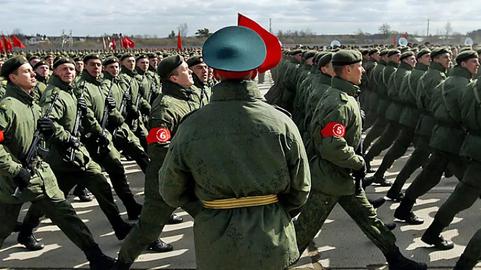Emil Filtenborg and Stefan Weichert are independent journalists based in Ukraine. In a weekly series for IranWire, they examine the landscape of disinformation in Russia and some of the false information that has emanated from the country since the outbreak of coronavirus.
War is not only fought on the beaches and landing grounds. Had Winston Churchill written that speech today, he would have been right to mention the media as one of the frontlines.
Hybrid warfare is a type of warfare in which the aggressor tries to dominate not only through conventional fighting, but also through the dual channels of diplomacy and disinformation.
The Digital Forensic Research Lab, an organization working under US-based think tank the Atlantic Council, is in the fray of this battle, striving to "identify, expose and explain" Russian disinformation. This week we interviewed its associate director, Lukas Andriukaitis, about disinformation, rewriting the Chinese/Russian cooperation we touched on last week and rewriting the history of the Second World War.
What is the Digital Forensic Research Lab?
We are a center under the Atlantic Council. To put it simply, our motto is to "identify, expose and explain disinformation." We use open-source tools and analysis, which separates us from other centers and NGOs, and the rest of the Atlantic Council.
Would you consider yourself a part of an information war?
Yes. I am Lithuanian, and people from the Baltics have been on the frontlines of the disinformation war for many years. When you are under attack, you have the choice to defend yourself or not. And we are under attack.
What characterizes the Russian disinformation campaigns during this pandemic?
There are three main things to keep in mind when talking Russian disinformation. One, it is an offensive targeting other countries. Two, they are opportunistic and look for things to react to like the current pandemic. Three, they have very clear goals.
What are those goals?
They are trying to weaken NATO and convert EU countries to leave the European Union. These things also make them different from the Chinese, who are more defensive, trying to convince the world that they are the solution to the problem, not the cause.
Does the Kremlin coordinate the disinformation campaign? Or are outlets acting of their own accord?
It is hard to pinpoint exactly. What we do is we follow the message to see if the narratives of the Kremlin, the media outlets and the social media groups are the same. If the messages from the Kremlin are pumped out by smaller outlets or Facebook groups, then we assume that it is coordinated.
There is a history of pushing the same narratives and stories, but it is really hard to provide proof that it is coordinated, and the Kremlin will never admit it.
Has the face of Russian disinformation changed since the pandemic started?
It has not changed in any significant way. It is still highly opportunistic, and if they see an opportunity to react, they will. For instance, in the Baltic countries, the Lithuanian government will say that the economy is suffering from the pandemic, while the Kremlin will say the economy is collapsing, and the EU is collapsing and is not helping them. They are nimble and reactive.
How does the Chinese/Russian partnership work?
It is interesting, and we are looking into it. From what we see now, it is mostly the coordination of narratives. They are feeding on one another's narratives, and maybe there is a deeper coordination that we do not know of, but both sides see mutual benefit in this. They are attacking the European Union and the Trump administration, saying they are not capable of handling the pandemic. It is still hard to say what the partnership is at this moment, but it is safe to assume that they are coordinating it to some extent.
I think a good way to look at it is to see it as an offensive. The Russian goals are more offensive, breaking the EU or NATO, and China is trying to save face and economic ties.
What is the deal with rewriting the history of the Second World War?
The Second World War is the basis for the Kremlin’s regime and identity. I think it is crucial for them to keep the narrative the way they want for two reasons. Domestic audiences need to think that they were the liberators in order to disguise their own atrocities and to keep the moral high ground. But also for external audiences, smearing countries for cooperating with the Nazis justifies 50 years of occupation.
***
A Western Counter-Attack
This week and last week, countries all over the world commemorated the end of the Second World War. At the same time, a group of democratic states issued a stinging rebuttal to Russia for attempting to rewrite its history.
Seventy-five years have passed since the Third Reich crumbled and the Allies liberated the occupied countries. The Allies and the Red Army met in Berlin and divided Europe into two halves: in the West, states were allowed to return to a state of democracy, human rights, and prosperity, while in the east, the Soviet Union swallowed up everything in its past. For 50 years nations east of Berlin were part of the Soviet Empire and ruled from Moscow until the USSR fell apart in the beginning of the 1990s.
As the iron curtain fell, and the occupants of former Soviet countries saw the daily lives of their Western neighbors, it posed the question: had they truly been liberated when the Red Army defeated the Nazis?
No, was the answer in a very harsh letter penned by the US and the Foreign Ministers of Bulgaria, the Czech Republic, Estonia, Hungary, Latvia, Lithuania, Poland, Romania, and Slovakia on the occasion of the 75th anniversary of the end of the war.
"For many decades,” they wrote, “numerous Europeans from the central and eastern part of the continent sacrificed their lives striving for freedom, as millions were deprived of their rights and fundamental freedoms, subjected to torture and forced displacement.
“The future should be based on the facts of history and justice for the victims of totalitarian regimes. We are ready for dialogue with all those interested in pursuing these principles. Manipulating the historical events that led to the Second World War and to the division of Europe in the aftermath of the war constitutes a regrettable effort to falsify history.”
This was quite plainly a response to Russia, which has repeatedly tried to rewrite the history of the Second World War, stating just last year that Poland started the war and that occupied countries including the Baltics were fascist states cooperating with the Nazis.
Also in this series:
Missing Data, Mud-Slinging and “Miracle Cures”: Why Disinformation Is Bad For Your Health
Iranian Online Network Still Peddling Coronavirus Disinformation
Putin’s Domestic Problems Eclipse Russian Disinformation Campaigns
China's Campaign to Protect President Xi against Coronavirus Criticism
Chinese Embassies Work Overtime to Diffuse International Fury Over Coronavirus
Russia Bans Coronavirus "Fake News" and Slams US Over Press Freedom
China Blocks Investigations Amid Refusal to Shut Down Wet Markets
visit the accountability section
In this section of Iran Wire, you can contact the officials and launch your campaign for various problems


























comments